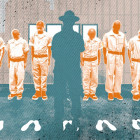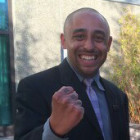
Holder Speaks Out Against Solitary Confinement of Mentally Ill Youths
|
U.S. Attorney General Eric H. Holder Jr. condemned “excessive” use of solitary confinement of children with mental illness in juvenile facilities.
Juvenile Justice Information Exchange (https://jjie.org/page/274/)

In late September, Torri was driving down the highway with her 11-year-old son Junior in the back seat when her phone started ringing.
It was the Hamilton County Sheriff’s deputy who worked at Junior’s middle school in Chattanooga, Tennessee. Deputy Arthur Richardson asked Torri where she was. She told him she was on the way to a family birthday dinner at LongHorn Steakhouse.
“He said, ‘Is Junior with you?’” Torri recalled.
Earlier that day, Junior had been accused by other students of making a threat against the school. When Torri had come to pick him up, she’d spoken with Richardson and with administrators, who’d told her he was allowed to return to class the next day. The principal had said she would carry out an investigation then. ProPublica and WPLN are using a nickname for Junior and not including Torri’s last name at the family’s request, to prevent him from being identifiable.
When Richardson called her in the car, Torri immediately felt uneasy. He didn’t say much before hanging up, and she thought about turning around to go home. But she kept driving. When they walked into the restaurant, Torri watched as Junior happily greeted his family.
Soon her phone rang again. It was the deputy. He said he was outside in the strip mall’s parking lot and needed to talk to Junior. Torri called Junior’s stepdad, Kevin Boyer, for extra support, putting him on speaker as she went outside to talk to Richardson. She left Junior with the family, wanting to protect her son for as long as she could ...

U.S. Attorney General Eric H. Holder Jr. condemned “excessive” use of solitary confinement of children with mental illness in juvenile facilities.

It’s time to stop blaming the kids and start implementing programs that address these complex issues.

“Status offenders” are being funneled into courts which don’t always ensure that kids have defense attorneys, according to the Center for Public Integrity.

Although gossip has always been a part of middle and high schools, some social media smartphone apps have been raising concerns about cyber-bullying in schools across the nation. Apps like Yik Yak, uMentioned and Whisper, which are designed to connect students on and around campus, allow users to post pictures and comments about others under the cloak of anonymity. “We see people being targeted, comments being posted about particular students or educators,” says Justin Patchin, co-director of the Cyberbullying Research Center and professor of criminal justice at the University of Wisconsin-Eau Claire. What started out as an app for college campuses to share inside jokes has trickled down to middle and high schools, where the apps have been used for cyberbullying or sexual harassment, he said. Katarina Grunden, a freshman at Grady High School in Atlanta, says she’s seen the app being used in inappropriate ways.

“Kids are kids, and kids should not be in the adult system,” Carmen Daugherty, CFYJ’s policy director, told JJIE.

A truancy court program in Baltimore keeps kids out of the school-to-prison pipeline.

How the simple act of education in prison can turn lives around.

Parents speak out about systemic abuse in drug rehabilitation programs, foster homes, and wilderness camps.